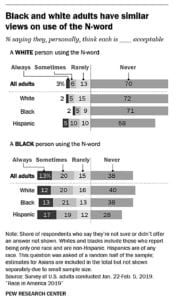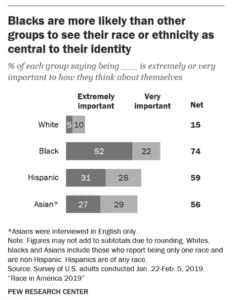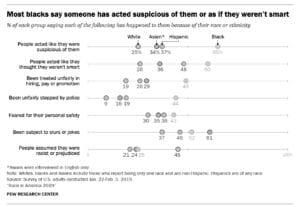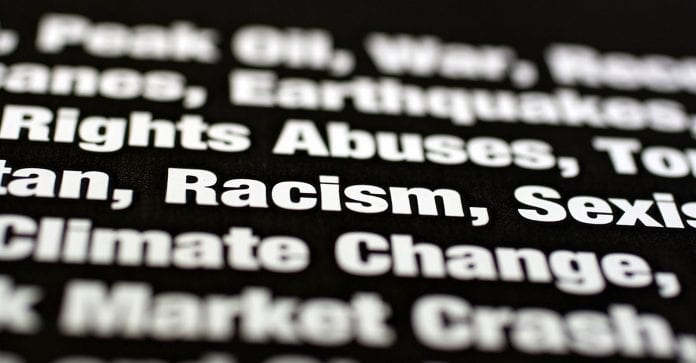by Juliana Menasce Horowitz, Anna Brown and Kiana Cox, Pew Research Center
More than 150 years after the 13th Amendment abolished slavery in the United States, most U.S. adults say the legacy of slavery continues to have an impact on the position of black people in American society today.
More than four-in-ten say the country hasn’t made enough progress toward racial equality, and there is some skepticism, particularly among blacks, that black people will ever have equal rights with whites, according to a new Pew Research Center survey.
 Opinions about the current state of race relations – and President Donald Trump’s handling of the issue – are also negative. About six-in-ten Americans (58 percent) say race relations in the U.S. are bad, and of those, few see them improving. Some 56 percent think the president has made race relations worse; just 15 percent say he has improved race relations and another 13 percent say he has tried but failed to make progress on this issue.
Opinions about the current state of race relations – and President Donald Trump’s handling of the issue – are also negative. About six-in-ten Americans (58 percent) say race relations in the U.S. are bad, and of those, few see them improving. Some 56 percent think the president has made race relations worse; just 15 percent say he has improved race relations and another 13 percent say he has tried but failed to make progress on this issue.
In addition, roughly two-thirds say it’s become more common for people to express racist views since Trump became president.
Blacks are particularly gloomy about the country’s racial progress. More than eight-in-ten black adults say the legacy of slavery affects the position of black people in America today, including 59 percent who say it affects it a great deal. About eight-in-ten blacks (78 percent) say the country hasn’t gone far enough when it comes to giving black people equal rights with whites, and fully half say it’s unlikely that the country will eventually achieve racial equality.
A majority of all adults (56 percent) say being black hurts people’s ability to get ahead at least a little, and 51 percent say the same about being Hispanic. In contrast, 59 percent say being white helps people’s ability to get ahead. Views about the impact of being Asian or Native American are more mixed.
Blacks, Hispanics and Asians are more likely than whites to say being white helps people’s ability to get ahead at least a little. Among whites, those who are more educated, as well as those who identify with or lean toward the Democratic Party, are particularly likely to see advantages to being white.
The nationally representative survey of 6,637 adults was conducted online Jan. 22-Feb. 5, 2019, in English and Spanish, using Pew Research Center’s American Trends Panel. In addition to exploring the public’s views about the state of race relations and racial inequality in America, the survey also looks at personal experiences with racial and ethnic discrimination and the role race plays in people’s lives.
Among the report’s findings:
* Democrats and those who lean Democratic are more likely than Republicans and Republican leaners to say it has become more common and more acceptable for people to express racist and racially insensitive views since Trump was elected president. Among Democrats, 84 percent say this is now more common and 64 percent say it’s more acceptable; fewer than half of Republicans say it has become more common (42 percent) and just 22 percent say it has become more acceptable for people to express these types of views.
* A majority of Americans (56 percent) say Trump has made race relations worse; just 15 percent say he has made progress toward improving race relations, while 13 percent say he has tried but failed to make progress and 14 percent say he hasn’t addressed this issue.
 * Thirty-seven percent say Barack Obama made progress on race relations when he was president, and 27 percent say he tried but failed. A quarter of Americans say Obama made race relations worse. Those retrospective views of Obama’s handling of race relations are nearly identical to views expressed during Obama’s last year in office.
* Thirty-seven percent say Barack Obama made progress on race relations when he was president, and 27 percent say he tried but failed. A quarter of Americans say Obama made race relations worse. Those retrospective views of Obama’s handling of race relations are nearly identical to views expressed during Obama’s last year in office.
* About half of black adults (52 percent) say being black has hurt their ability to get ahead at least a little, with 18 percent saying it has hurt a lot. About a quarter of Hispanics and Asians (24 percent each) and just 5 percent of whites say their race or ethnicity has had a negative impact. In turn, whites are more likely than other groups to say their racial background has helped them at least a little.
* Among blacks, those with at least some college experience are more likely than those with less education to say being black has hurt their ability to get ahead.
* Small shares of whites across educational levels say their racial background has hurt their ability to succeed, but those with a bachelor’s degree are more likely than those with less education to say being white helped them at least a little.
* Across all racial and ethnic groups, more point to their own hard work than to any other attribute, including their race, their gender, the people they know or their family’s financial situation, as something that helped them get ahead.
* Whether or not they see their race as an obstacle for them personally, about two-thirds of blacks (68 percent) say being black generally hurts a person’s ability to get ahead in the country; 55 percent of whites say the same.
* Among those who say being black hurts a person’s ability to get ahead, blacks are far more likely than whites to point to racial discrimination, less access to high-paying jobs and less access to good schools as major reasons why this is the case.
* Whites are more likely than blacks to point to family instability and lack of good role models as major obstacles for black people. The same shares in both groups (22 percent) say a lack of motivation to work hard is to blame.
(To view the entire report, visit https://pewrsr.ch/2VxeKbp.)




